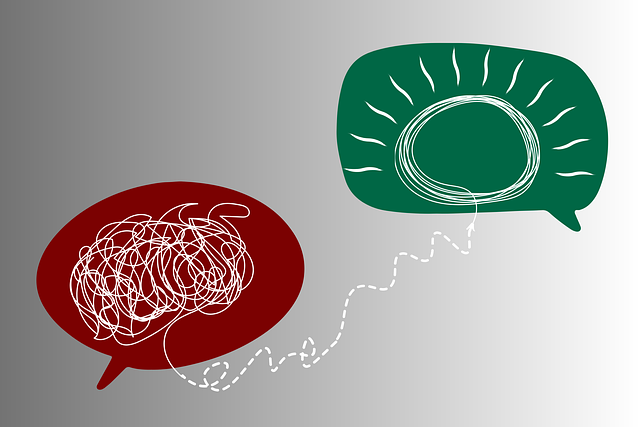In today's stressful world, mental wellness coaching is gaining prominence as a valuable tool for improving mental health, especially in communities like Broomfield where Broomfield Polyamorous and Open Relationships Therapy (BPART) is increasingly sought after. These programs combine therapeutic practices with personal development strategies to promote resilience, self-awareness, and emotional intelligence through holistic approaches. The growing need highlights the rising prevalence of mental health challenges, emphasizing early intervention and preventative measures. By encouraging individuals to prioritize psychological well-being, BPART coaching programs foster self-care routines, boost confidence, enhance coping mechanisms, and destigmatize mental health discussions, making them essential components of a comprehensive wellness strategy. These tailored strategies cater to diverse needs, incorporating techniques from BPART to revolutionize interpersonal dynamics and empower deep intimacy alongside individual growth and well-being. Measuring impact through pre-post assessments, feedback forms, and qualitative interviews is vital for ensuring program effectiveness and continuous improvement.
Mental wellness coaching programs are gaining prominence as essential tools for fostering holistic well-being. This article explores the development of such programs, focusing on unique approaches like Broomfield Polyamorous and Open Relationships Therapy. We delve into strategic design, implementation, and measurement techniques to ensure effectiveness. By understanding the evolving needs of individuals seeking mental health support, these programs can revolutionize care, offering personalized guidance for navigating complex relationships and enhancing overall mental wellness.
- Understanding the Need for Mental Wellness Coaching Programs
- Designing Effective Broomfield Polyamorous and Open Relationships Therapy
- Implementation Strategies for Success in Coaching Programs
- Measuring Impact and Continuous Improvement
Understanding the Need for Mental Wellness Coaching Programs

In today’s fast-paced and often stressful world, mental wellness is more important than ever. The demand for accessible and effective support has led to a growing recognition of coaching programs as valuable tools for improving mental health. These programs cater to diverse needs, especially in communities like Broomfield where Polyamorous and Open Relationships Therapy is increasingly sought after. By combining therapeutic practices with personal development strategies, mental wellness coaching offers a holistic approach to nurturing resilience, self-awareness, and emotional intelligence.
The need for such initiatives stems from the rising prevalence of mental health challenges, highlighting the importance of early intervention and preventative measures. Encouraging individuals to prioritize their psychological well-being is crucial, and these coaching programs play a significant role in fostering self-care routines for better mental health. Moreover, they can boost confidence, enhance coping mechanisms, and contribute to public awareness campaigns by destigmatizing mental health discussions, making them essential components of a comprehensive wellness strategy.
Designing Effective Broomfield Polyamorous and Open Relationships Therapy

In the realm of Broomfield Polyamorous and Open Relationships Therapy, effective coaching programs must be designed with a deep understanding of the unique dynamics and challenges these relationships present. The therapy should focus on inner strength development for all involved parties, fostering an environment where open communication is encouraged and mental health awareness is prioritized. Coaches play a pivotal role in guiding individuals through complex emotions, helping them navigate conflict resolution techniques to build resilience and strengthen their connections.
By integrating evidence-based practices tailored to polyamorous and open relationships, these coaching programs can revolutionize the way individuals address interpersonal dynamics. This approach ensures that every member feels validated, respected, and supported in their pursuit of healthy, fulfilling relationships. Ultimately, it empowers them to cultivate deep intimacy while maintaining individual growth and well-being.
Implementation Strategies for Success in Coaching Programs

The success of mental wellness coaching programs lies in strategic implementation that caters to diverse needs. One effective approach is incorporating techniques like Broomfield Polyamorous and Open Relationships Therapy, which fosters inclusive spaces for clients to explore their emotional connections and relationships. This therapy can be a game-changer, especially for individuals dealing with social anxiety or those seeking healthier communication patterns.
Additionally, integrating practices such as Burnout Prevention strategies and Mindfulness Meditation sessions into coaching programs enhances overall well-being. These techniques teach clients to manage stress, improve focus, and cultivate a sense of calm, which are crucial elements in preventing Depression. By combining therapeutic methods with modern wellness practices, coaches can create comprehensive programs that not only address immediate concerns but also empower individuals with lifelong skills for mental resilience and maintenance.
Measuring Impact and Continuous Improvement

Measuring the impact of mental wellness coaching programs is a crucial step to ensure their effectiveness and continuous improvement. This process involves utilizing diverse evaluation methods, such as pre-post assessments, participant feedback forms, and qualitative interviews, to gauge progress and identify areas for enhancement. By collecting and analyzing these data points, coaches can gain valuable insights into the program’s success and tailor interventions accordingly. For instance, Broomfield Polyamorous and Open Relationships Therapy has successfully incorporated empathy-building strategies and positive thinking exercises, as indicated by participants’ self-reported improvements in relationship satisfaction and overall well-being.
Continuous improvement necessitates regular risk assessments for mental health professionals to mitigate potential harm and ensure ethical practices. This includes evaluating the program’s design, delivery methods, and participant readiness. By fostering a culture of data-driven decision-making, coaches can create dynamic, adaptive programs that cater to the evolving needs of their clients. Thus, through systematic measurement and reflexive practice, mental wellness coaching remains relevant, impactful, and aligned with best-in-class standards in the field.
Mental wellness coaching programs, such as Broomfield Polyamorous and Open Relationships Therapy, are vital tools for enhancing individuals’ mental health and overall well-being. By combining effective design strategies with implementation excellence, these programs can significantly impact positive change. Measuring their success is crucial for continuous improvement, ensuring that coaching remains tailored to the evolving needs of participants. Through dedicated effort and data-driven insights, we can revolutionize mental wellness support, fostering healthier and happier lives in our communities.









